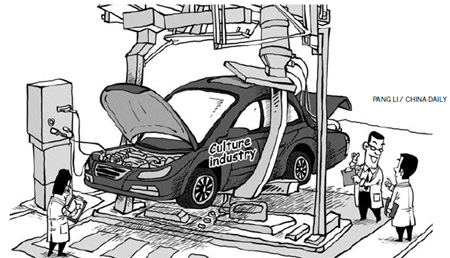Debate: Cultural industry
Updated: 2011-11-21 08:01
(China Daily)
|
|||||||||
What ails the China's cultural industry? And how can it be turned into a healthy and prosperous sector? Three experts enlighten us with their suggestions.
Jia Xudong
It's all about global competitiveness
International competitiveness is key to cultural enterprises' success in the global cultural market. Without strong international competitiveness, Chinese cultural enterprises cannot build a strong cultural industry and the country cannot become a cultural power.
In 2008, the overall yearly income of China's cultural industry was 1.19 trillion yuan ($187.9 billion), about four times the annual takings of just one US company, Time Warner Inc, the same year - and the US has many companies like Time Warner. Since Chinese cultural enterprises are far from being internationally competitive, it's very important to make efforts to make them qualified market players first.
To become a cultural power, China has no option but to make cultural enterprises globally competitive. And the first step to that is making Chinese cultural enterprises qualified market players.
The international competitiveness of cultural enterprises is the same as that of other kinds of enterprises. Although there are various theories about enterprises' global competitiveness, almost all of them agree that it stems from within the enterprises and the environment in which they exist and develop. Thus China needs to make efforts on three fronts to make its cultural enterprises competitive on the international stage.
First, the enterprises, rather than the government, should play the main role in the development of the cultural industry. That's the only way Chinese cultural enterprises can grow into qualified market players. Without having qualified cultural enterprises, it's meaningless to talk about global competitiveness, even though the government is promoting the culture industry and will do more for its development.
Besides, the academia should define the boundary and function of the government, and adjust the cultural industry's policies. All policies on the cultural industry's development should focus on allowing cultural enterprises to play a key role in the market, and create proper institutional, legal and other necessary environments for their own growth and development.
Second, the government should promote a cooperative mechanism among the authorities, production sectors, colleges and research institutions in various fields.
Cooperative mechanism aims at combining the advantages of the government, production sectors, colleges and research institutions. It increases the global competitiveness of the cultural industry by jointly tackling the key subjects related to the industry. Hence, the establishment of the mechanism should be based on the dynamics of every field, and focus on creating demand through guaranteed promotion by the government and support of public finance.
Also, the enterprises, the government and the academia should cooperate to better plan and select good projects by employing more advanced guiding theories.
Third, Chinese cultural enterprises should try to achieve innovation-oriented self-reorganization. Since the cultural enterprises' self-consciousness and action directly influence their global competitiveness, they should take advantage of the positive factors of China's macro environment and avoid being influenced by negative factors in order to first improve their internal competitiveness.
The efforts made by cultural enterprises reflect their consciousness about and competence in innovation. But the demand for continuous innovation is always in conflict with inertia of an enterprise.
To resolve this conflict, the cultural enterprises should form innovative-oriented organizational structures, for only by maintaining organizational flexibility can they achieve sustained innovation and increase their global competitiveness.
The author is deputy director of the Center for Cultural Studies of the Chinese Academy of Social Sciences.
Yang Jun
Creativity is the success mantra

The ratio of China's cultural industry to the country's GDP was just 2.75 percent in 2010, or one-third that of developed countries like the United States. But that also means China's cultural industry has a lot of potential.
Moreover, a historical opportunity awaits China's cultural industry because the government's policy and the fast pace of the country's economic growth can now give it strong support.
The core competitiveness of the cultural industry depends on creativity - just like the success of the film industry depends on its ability to tell a story excellently through audio-visual means.
China has a more profound history and culture compared to the US. But its film industry cannot exploit them and thus cannot compete with Hollywood. The sticking point is a lack of creation to use the available materials to tell a compelling story.
Creativity and innovation are crucial to the development of any industry. For example, the script should be the soul of a film or a TV series because it is crucial to tell a good story. A film cannot be competitive just because it's technically brilliant.
This void has been created by the dearth of good scriptwriters. And there are three reasons for that. First, Chinese scriptwriters tend to work alone whereas in the US, scriptwriting is more of a collective effort because scriptwriters work in consultation with dialogue writers and other behind-the-camera artists.
Second, Chinese scriptwriters are not given their due. Chinese filmmakers tend to follow the Soviet model, in which the director is the core of the film. In contrast, Hollywood productions are more successful because in the US, a production revolves around the producer, who is always searching for the best story and the best team to tell that story.
Scriptwriters in China are poorly paid compared with their counterparts in developed countries. In Hollywood, for example, scriptwriters and actors (except for the big stars) get the same remuneration. In South Korea, they can earn even more than the actors and have the right to choose actors who they think are most suitable for the roles. But in China, a top actor can get 500,000-600,000 yuan ($78,840-94,608) for each episode of a TV series, while even a top scriptwriter gets only 100,000 yuan to 200,000 yuan.
The third reason why there is a dearth of good scriptwriters is personnel training. Most of the scriptwriters in China are graduates from film universities and may be skillful in writing. But they lack real life experience that makes for a compelling story. In the US, scriptwriters come from a wide range of backgrounds, from science professors to workers, and thus are more creative in their work.
It is now the government's responsibility to develop China's culture industry into a global leader. For that, the government should make efforts to produce more creative cultural products and artists involved in the cultural industry should study Western esthetics closely.
For a good example of how to understand the global audience and find the common elements in the cultures of China and other parts of the world, we need look no further than film director Ang Lee.
China is expected to become the second largest film market in the world and the box office return in the country is expected cross 30 billion yuan in five years. All these will be of little use unless the productions are more creative and meaningful.
The author is general manager of Jiangsu Zhongdao Films. The article is based on excerpts of his interview with China Daily's Zhu Jin.
Chang Jihong
Support for entertainment agencies
China is eager to boost its cultural industry. For that, the entertainment industry, often specified as movies, TV series and pop music, has to play a leading role and entertainers have to act as the industry's "spokespersons".
Indeed, more Chinese stars than ever are on the world's who's who list today. Right behind them are their agents and entertainment agencies, which have grown strong over the past two decades and formed an emerging industry - the entertainment agency industry.
From the 1990s through the first decade of the 21st century, the Chinese entertainment agency sector has passed through three phases - from independent agents serving individual entertainers to a team of agents for a number of artists to agencies serving even more artists.
The sector's work requirements and ethics have changed from one phase to another, too. Being sincere, responsible and trustworthy is of prime importance for independent agents. Likewise, planning, coordination and foresight are vital for a team of agents. And credibility, brains and resources make good agencies, which are akin to companies.
These benchmarks of success have been the features of most Chinese agents that have passed through the three phases.
Today, there is a huge demand for movies, TV series and other related products. And the media pay a lot of attention to entertainers, prompting investors and producers to attach greater importance to them and make full use of their popularity to make good money at the box office.
All these have raised the market value of entertainers to much higher levels today than in the old days, which in turn has elevated the status and worth of their agencies, teams and companies. To a large extent, entertainers' agencies, teams and companies have played the role of middlemen in the entertainment industry.
Entertainment agent, as a profession, has a long history. In China, however, it became a profession only in the early 1990s, a time when an agent was a one-man team burdened with many responsibilities, including inspecting scripts, accompanying the client to different shooting locations, mapping out the client's career development and arranging for even trivial matters. After two decades of growth, the job details of Chinese agents have changed drastically, and now entail cooperative work.
Today, an entertainment agency has to make its client a star in the domestic market. More importantly, it has to fulfill its social responsibility of presenting a good public image of its client and putting him/her in the global spotlight.
But the strength of individual agents, teams or companies is still limited. When it comes to industrial institutions, rules, ethics and the rights of agencies or companies to take a decision about the industry, China lags far behind the major exporters of cultural products, such as the United States and South Korea.
In the US, the Screen Actors Guild has the major responsibility of coordinating government administration and market competition, ensuring self-discipline and maintaining the industry's autonomy. In South Korea, thanks to government sponsorship and policy support, entertainment agents have set up their own industrial association, which play an instructive role and has the authoritative say in industrial development. That's why the association could take charge of one part of the Pusan International Film Festival.
Compared with the US and South Korea, China's entertainment agency industry is found wanting in many aspects, including industrial regulations, standards and training of talents. Consequently, the strength of agents and agencies remains uneven.
The Chinese government is determined to advance the cultural industry, which is in ascendance. The entertainment agency sector, as a key part of the entertainment industry, calls for greater government attention, support and supervision. China's cultural industry, especially the entertainment industry, can be vitalized, produce high-grade moves and TV series and see the homegrown stars shine on the globe stage only if the government takes measures to promote it properly.
The author is a well-known Chinese entertainment agent, representing famous actresses and actor such as Jiang Wenli and Sun Li, and Liu Ye.
(China Daily 11/21/2011 page9)











